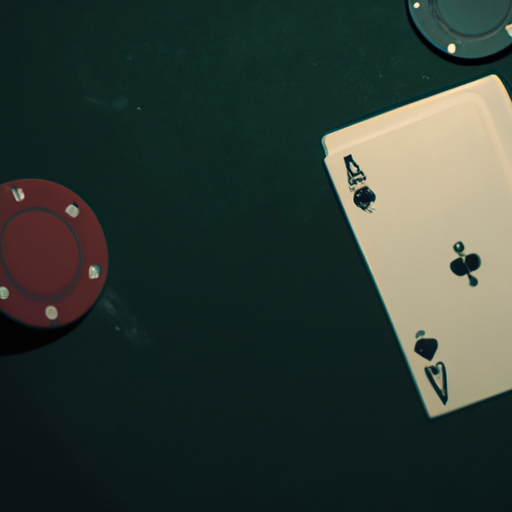Poker isn’t just a game of chance; there’s a huge element of skill to it. It requires players to make calculated decisions based on their opponents’ behavior, body language, and betting patterns. The intersection of poker and psychology is a fascinating area of study that explores how human behavior and decision-making impact the game. In this article, we will delve into the various psychological factors that come into play during a game of poker and how players can use this knowledge to their advantage.
The Psychology of Bluffing in Poker: How to Read Your Opponents
Bluffing is a crucial aspect of poker, and understanding it can give you a significant advantage at the table. It’s also one of the most clear examples of psychology in poker.
Bluffing is the act of making your opponents believe that you have a better hand than you actually do. It’s a risky move, but it can pay off big if you do it right. The key to successful bluffing is to read your opponents and their behavior. You need to be able to spot their tells and understand what they’re thinking.
One of the most common tells in poker is the way your opponent bets. If they bet quickly and confidently, it usually means they have a strong hand. On the other hand, if they hesitate or seem unsure, it could be a sign that they’re bluffing. Of course, this isn’t always the case, and some players are skilled at hiding their tells.
Another tell to look out for is body language. If your opponent is fidgeting, avoiding eye contact, or breathing heavily, it could be a sign that they’re nervous or trying to hide something. Conversely, if they’re relaxed and comfortable, it could mean that they have a strong hand.
It’s important to note that not all tells are obvious. Some players are skilled at hiding their emotions and behavior, making it difficult to read them. In these cases, you need to rely on other factors, such as the way they’ve played in previous hands or their overall strategy.
Reading your opponents is only half the battle, though. You also need to be able to control your own behavior and emotions. If you’re nervous or anxious, it could give away your hand and make it easier for your opponents to read you. On the other hand, if you’re too confident or aggressive, it could backfire and make your opponents suspicious.
One way to control your emotions is to practice mindfulness. This involves being aware of your thoughts and feelings without judgment or attachment. By practicing mindfulness, you can learn to stay calm and focused, even in high-pressure situations like a poker game.
Another way to improve your bluffing skills is to study the game and learn from experienced players. There are countless books, videos, and online resources that can teach you the ins and outs of poker strategy and psychology. By studying these resources and practicing your skills, you can become a more confident and successful player.
The psychology of bluffing is a fascinating aspect of poker that can give you a significant advantage at the table. By learning to read your opponents and control your own behavior, you can become a more skilled and successful player. So next time you sit down at the poker table, remember to keep your eyes and ears open, and don’t be afraid to bluff when the opportunity arises.
The Role of Emotions in Poker: How to Stay Calm and Focused
Psychology doesn’t just apply to your opponents. Controlling your own emotions and keeping your mental game on point is one of the most overlooked aspects of poker. In this section, we’ll cover the importance of the many different emotions you can feel in poker.
Emotions are an integral part of the human experience. They can be positive, such as joy and excitement, or negative, such as anger and frustration. In poker, emotions can be both a blessing and a curse. On the one hand, positive emotions can help you stay focused and motivated. On the other hand, negative emotions can cloud your judgment and lead to poor decision-making.
One of the most important emotions to control in poker is tilt. Tilt is a state of emotional frustration that can occur when you experience a bad beat or a series of losses. Tilt can cause you to make irrational decisions and play poorly. To avoid tilt, it’s important to recognize when you’re feeling frustrated and take a break from the game. Take a few deep breaths, go for a walk, or do something else to clear your mind.
Another important emotion to control in poker is fear. Fear can cause you to play too conservatively and miss out on opportunities to win. To overcome fear, it’s important to have confidence in your abilities and trust your instincts. Remember that poker is a game of skill, and if you’ve put in the work to improve your game, you have nothing to fear.
In addition to controlling negative emotions, it’s also important to cultivate positive emotions in poker. One of the most important positive emotions to cultivate is focus. Focus is the ability to concentrate on the task at hand and block out distractions. To improve your focus, try to eliminate distractions from your environment, such as your phone or other electronic devices. You can also try meditation or visualization exercises to help improve your focus.
Another important positive emotion to cultivate in poker is confidence. Confidence is the belief in your abilities to succeed. To build confidence, it’s important to set achievable goals and work towards them. Celebrate your successes, no matter how small, and use them as motivation to continue improving your game.
In conclusion, the role of emotions in poker is a fascinating intersection of psychology and strategy. To be successful in poker, it’s important to control negative emotions such as tilt and fear, while cultivating positive emotions such as focus and confidence. By mastering your emotions, you can improve your game and increase your chances of success. So the next time you sit down at the poker table, remember to stay calm, focused, and in control of your emotions.
The Importance of Mindset in Poker: How to Develop a Winning Attitude

The way you think and feel can have a huge impact on your success at the poker table. In this section, we’ll explore how you can develop a winning attitude to improve your game.
One of the most important aspects of poker psychology is mindset. Your mindset is your attitude and approach to the game. It’s how you think and feel about your abilities, your opponents, and the cards you’re dealt. A positive mindset can help you stay focused, make better decisions, and ultimately win more hands.
So how do you develop a winning mindset in poker? The first step is to believe in yourself. You need to have confidence in your abilities and trust that you can make the right decisions at the right time. This doesn’t mean you should be overconfident or arrogant, but rather that you should have a healthy sense of self-assurance.
Another important aspect of mindset is staying focused. Poker can be a long and grueling game, and it’s easy to get distracted or lose your concentration. But if you want to be successful, you need to stay focused on the task at hand. This means avoiding distractions like your phone or other players’ conversations, and staying present in the moment.
Finally, a winning mindset in poker requires a willingness to learn and adapt. No matter how good you are, there’s always room for improvement. You need to be open to new strategies and techniques, and willing to adjust your game as needed. This means studying the game, analyzing your own play, and seeking out advice and feedback from other players.
Now that we’ve covered the importance of mindset in poker, let’s look at some specific tips for developing a winning attitude.
First, set realistic goals for yourself. Don’t expect to win every hand or every game. Instead, focus on making good decisions and playing your best. Celebrate small victories along the way, and use setbacks as opportunities to learn and grow.
Second, stay positive. It’s easy to get frustrated or discouraged when things aren’t going your way, but a negative attitude will only make things worse. Instead, try to stay optimistic and focus on the things you can control. Remember that poker is a game of ups and downs, and that even the best players lose sometimes.
Third, practice good self-care. Poker can be mentally and physically exhausting, so it’s important to take care of yourself. Get enough sleep, eat healthy foods, and exercise regularly. Take breaks when you need them, and don’t be afraid to step away from the table if you’re feeling overwhelmed or stressed.
Finally, surround yourself with positive influences. Seek out other players who share your mindset and values, and avoid those who are negative or toxic. Join a poker community or forum where you can connect with like-minded players and share tips and strategies.
Developing a winning mindset in poker requires confidence, focus, adaptability, and a willingness to learn and grow. By setting realistic goals, staying positive, and practicing good self-care, you can improve your game and achieve greater success at the poker table. So go ahead and give it a try – you might be surprised at what you can accomplish with the right mindset.
The Connection Between Risk-Taking and Poker: How to Manage Your Bankroll

Psychology is an important part of poker that’s highly connected with risk-taking. Using psychology to bluff is an effective technique, but you shouldn’t overlook proper bankroll management. This is what enables you to stay in the game for the long run and take risks effectively.
One of the most important things to understand about risk-taking is that it is not always rational. In fact, many of the decisions we make are based on emotions rather than logic. This is particularly true when it comes to gambling, where the thrill of the game can often override our better judgment. To compensate for this, proper bankroll management is an absolute must.
To manage your bankroll effectively, it is important to be aware of these emotional biases and to try to overcome them. This means setting clear limits on how much you are willing to spend, and sticking to those limits even when you are tempted to keep playing.
Another important factor to consider when managing your bankroll is variance. Variance refers to the natural fluctuations in luck that occur in any game of chance. Even the best players in the world will experience losing streaks from time to time, and it is important to be prepared for these fluctuations. If you feel that you experience more variance, you’ll need a bigger bankroll to handle the potential swings.
Of course, managing your bankroll is only one aspect of playing poker. To be successful at the game, you also need to have a solid understanding of strategy and game theory. But by combining this knowledge with an understanding of the psychology of risk-taking, you can become a more effective player and increase your chances of winning.
The connection between risk-taking and poker is a fascinating one, and it is something that has been studied extensively by psychologists. By understanding the psychology of risk-taking, you can learn how to manage your bankroll effectively and make better decisions at the poker table. Whether you are a seasoned pro or a beginner, taking the time to understand these principles can help you become a more successful player and enjoy the game even more.
The Impact of Body Language in Poker: How to Use Nonverbal Cues to Your Advantage
One of the most critical aspects of poker psychology is body language. In this section, we’ll explore the impact of body language in poker and how you can use nonverbal cues to your advantage.
Body language is a form of nonverbal communication that can reveal a lot about a person’s thoughts and feelings. In poker, players use body language to try to deceive their opponents or to convey information about their hand. For example, a player might try to appear confident when they have a weak hand or nervous when they have a strong hand.
One of the most common forms of body language in poker is the “poker face.” A poker face is a blank expression that reveals nothing about a player’s emotions or thoughts. While a poker face can be effective in concealing information, it can also be a disadvantage if a player is unable to read their opponent’s emotions.
Another important aspect of body language in poker is posture. A player’s posture can reveal a lot about their confidence and level of comfort at the table. A player who is slouching or fidgeting may be nervous or uncomfortable, while a player who is sitting up straight and making eye contact may be more confident.
Gestures and movements are also important nonverbal cues in poker. For example, a player who is constantly checking their chips or looking at their cards may be signaling that they have a strong hand. On the other hand, a player who is avoiding eye contact or fidgeting may be signaling that they have a weak hand.
So how can you use nonverbal cues to your advantage in poker? The first step is to pay attention to your own body language. Make sure you are sitting up straight, making eye contact, and projecting confidence. This will help you to appear more intimidating to your opponents and may cause them to make mistakes.
The next step is to observe your opponents’ body language. Look for signs of nervousness, discomfort, or confidence. If you notice that a player is constantly checking their chips or looking at their cards, they may have a strong hand. If a player is avoiding eye contact or fidgeting, they may have a weak hand.
Once you have observed your opponents’ body language, you can use this information to make strategic decisions. For example, if you notice that a player is nervous or uncomfortable, you may want to bet aggressively to try to force them to fold. On the other hand, if you notice that a player is confident, you may want to play more cautiously to avoid making mistakes.
In conclusion, the intersection of poker and psychology is a fascinating area of study that has gained increasing attention in recent years. Understanding the psychological factors that influence decision-making in poker can help players improve their game and make better decisions at the table. Additionally, the study of poker psychology can provide valuable insights into human behavior and decision-making more broadly.
